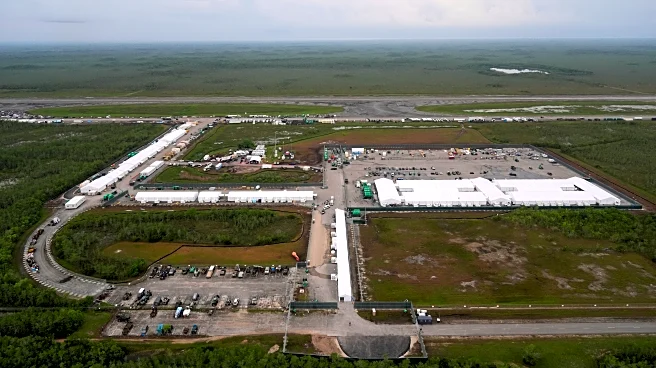What's Happening?
Economist Paul Krugman has drawn parallels between the explosive growth of renewable energy in the past decade and historical infrastructure projects like the Erie Canal. Krugman notes that renewable energy has benefited from a 'virtuous circle' of falling
costs and increasing production, driven by subsidies that have made it competitive against fossil fuels. He highlights that solar and wind energy produced 15% of the world's electricity in 2024 and accounted for 63% of the growth in electricity production since 2019. Krugman emphasizes the geopolitical implications of this growth, particularly as China advances in green energy. He also references historical figures like Alexander Hamilton and George Washington, who advocated for government investment in infrastructure to boost economic development.
Why It's Important?
The growth of renewable energy is significant for several reasons. It represents a shift away from fossil fuels, which has implications for climate change and environmental policy. The increase in renewable energy production also affects global geopolitics, as countries like China invest heavily in green technologies, potentially altering international power dynamics. In the U.S., this growth challenges traditional energy policies and could lead to changes in public policy and industry practices. The historical context provided by Krugman underscores the importance of government support in driving technological and infrastructure advancements, which can have long-lasting impacts on economic development.
What's Next?
The continued expansion of renewable energy is likely to influence future U.S. energy policies, potentially leading to increased investment in green technologies and infrastructure. As renewable energy becomes more prevalent, traditional energy sectors may face pressure to adapt or risk obsolescence. Policymakers may need to address the economic and social impacts of this transition, including job creation in new industries and the potential decline of fossil fuel-related jobs. The geopolitical landscape may also shift as countries compete for leadership in renewable energy technologies.
Beyond the Headlines
The rise of renewable energy could lead to broader cultural and ethical shifts, as societies prioritize sustainability and environmental responsibility. This transition may also prompt legal changes, such as new regulations and incentives to support green energy. Long-term, the growth of renewables could redefine economic models and consumer behavior, as individuals and businesses increasingly adopt sustainable practices.















